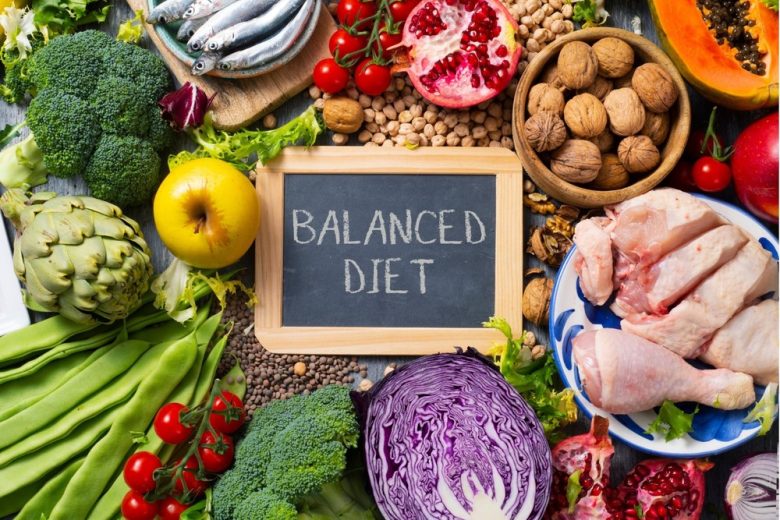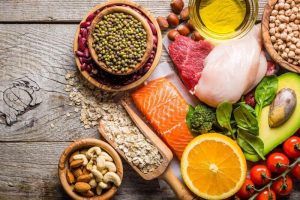Food is enjoyable in all aspects, but what if we told you that eating could be a delight and can promote one’s well-being? Adopting a healthy diet is not simply about looking at one’s calorie intake or restricting oneself from certain foods. It has to do with satisfying the deficiencies of what the body needs in an appropriate manner. Picture being more active—physically and perhaps mentally—and even having an improved outlook by simply incorporating healthy components into meals. In the following sections, we will focus on demonstrating the benefits associated with following a healthy diet, as well as the changes it will cause, not only in your body but also in your lifestyle. Who is up for some easy tips on how to live well? Let’s get right to it!
The Importance of Macronutrients in a Balanced Diet:
The macronutrients are the building blocks of healthy eating. These comprise the energy reserves that the body utilizes on a day-to-day basis. However, proteins, fats, and carbohydrates are the three main macronutrients, which have different functions. Proteins are needed to grow, maintain and heal muscle and other tissue. Such proteins create enzymes and hormones—proteins that are responsible for many activities in the body. They can be obtained from meats, dairy products, sundry beans, and grains.
Fats are often stigmatized, but they are important for brain and hormone health. Monounsaturated fats that can be derived from avocado, olive oil and fish promote cells. Carbohydrates are the main source of energy for the body. It is not only energy but also fibre for digestion that whole grains, fruits, and vegetables provide to the body as well.
Finding the proper combination of these macronutrients guarantees maximum efficiency in daily tasks as well as ensuring preventative health in the long run. Compromising on variety within each category should not be synonymous with compromising on balance.
Key Micronutrients for Healthy Living:
Maintaining health requires a good intake of the three micronutrients. This one incorporates elements such as vitamins and minerals, which are also crucial for the functioning of the body.
For instance, vitamins A, C, D, E and various B-bound vitamins are important for energy metabolism, immunity, and skin aspects. Each of the vitamins has its own specific functions in contributing to one’s wellness.
Minerals like calcium, potassium, magnesium and even iron are also very critical to one’s wellness. They assist in maintaining strong healthy bones, proper muscle function, healthy hearts and transport oxygen around the body.
These micronutrients should optimally be obtained from whole foods. Berries and green vegetables are rich in vitamins and nuts and seeds in minerals
Incorporating different foods into your meals should guarantee the coverage of all essential micro nutrients. This not only makes your meals more interesting but is favourable for achieving healthy aspirations over prolonged periods.
How a Balanced Diet is Related to Psychological and Physical Wellness:
Dietary practices are very essential prerequisites for psychological and physical wellness. Feeding your body with good food replenishes energy levels and enhances one’s productivity in daily activities. When you take a range of nutrients, you are not working only on the muscular system but even on the brain. Nutritional factors such drops of omega-3 oils like fish, walnuts, etc. improve cognition and stabilize moods.
Vitamins and minerals can reduce stress hormones and stress effects. Getting nourished with numerous fruits and vegetables helps to alleviate anxiety and contributes to the emotional wellbeing of the individual. When you are well emotionally, you also tend to feel good, which is reflected in the image of one’s self. You can appreciate the link between mood and nutrition by considering one’s mood after eating certain foods—food that is likely to improve one’s mood or vice versa.
Including whole grains such as rice brings about a balance of blood glucose levels and helps in providing more energy for a longer period of time. This regularity makes it easier to concentrate for extended periods while doing work or studying so that challenges can be faced to the fullest.
Strategies for Integrating Healthy Eating Habits into Your Life:
Make simple adjustments first. Replace as much as one soft drink to water every day. This is a small and very easy change, which can have big benefits in the long run. Don’t wait until you are hungry to think of what you will eat. You see that if you prepare a weekly menu, you are less likely to go for unhealthy fast foods in a hurry. With each meal, make an effort to add extra servings of fruits and vegetables. They contain a lot of vitamins; they also make the plate look nice.
Try using grain products that are less processed. Whole grain carbohydrates such as brown rice, quinoa, or whole grain breads help fill you up but also provide nutrients needed. If you are hungry, respond to the requirement that the body screams out. This is key to helping you control how much food you eat and, at the same time, helping you digest the food in the right way. Variety is important as well! Changing the protein source every so often—beans, nuts, fish, or poultry—will enhance the flavours of meals and balance it all.
Consequences of Bad Nutrition in the Body:
Nutrition is among the factors that affect the health of the individual with regard to their health and body functioning. For instance, a vitamin deficiency causes tiredness and feeling weak. If the body doesn’t get a sufficient amount of fuel, energy reserves get used up quickly. The outer display also may take a hit. The skin may turn pale, hair may become brittle and fall off, and nails may also become brittle and break. Such clear signs tend to be alarming as they indicate that dietary intake is low.
The same goes for wellbeing. Poor nutrition also contributes to mental illnesses, especially depression and anxiety. There are nutrients that the body needs and without these, the brain may start experiencing mood swings and the progressive loss of cognitive functionality. An unbalanced diet leads to these problems as well. For instance, too little fibre can cause constipation, while too many processed foods can upset gut flora.
Obese people with diabetes, hypertension, and all Heart diseases also eat poor foods. Long-standing failure in eating nutrition lays the groundwork whereby complications of health will emerge in the subsequent years.
Conclusion:
A balanced diet is not just a modern social notion; rather, it is a characteristic of a healthy body. By feeding their bodies right, individuals are more equipped to function adequately. A requirement is that one embodies this kind of lifestyle for the results to stick. Greater energy levels, enhanced regulation of feelings, as well as improved performance physically are just a tip of the changes one undergoes.
Be conscious that even the tiniest step makes a difference. the number of empty calories coming from the consumption of sugary items can be reduced by simply substituting some of those calories with the consumption of fresh fruits or green leafy vegetables; these changes help with time. In addition, learning to eat mindfully has benefits on health as well as enhancing the way one views food from mere provision to use.
To undertake this endeavour requires determination; however, it is very rewarding in terms of energy and health. The future looks good when you make the choice to be moderate in both food intake and all other factors.
FAQs:
1. What is a balanced diet?
A balanced diet is defined as a diet that contains a variety of foods in the proper proportions so that the body gets all the nutrients that it needs to work. It includes the macronutrient elements, that are the carbohydrates, proteins, and fats, and the micronutrient elements, vitamins, as well as minerals.
2. How can I be sure I’m consuming a healthy balance of food?
One method to evaluate your food intake is to follow dietary recommendations or tools like MyPlate. Consume a variety of foods and food groups, such as fruit vegetables or whole grains, lean meat, and other healthy oils, while minimizing the intake of highly refined carbohydrates and fats.
3. Is it still possible to maintain proper nutrition and eat the foods I love?
For sure! It doesn’t mean that you will never have the chance to enjoy any of your preferred desserts or dishes. Everything depends on you inside and over the situation. There are reasonable servings of these foods, or you can seek healthier alternatives to those that you love so much.
4. When can I expect to see the results from diet change?
Results depend on the person’s initial situation and the particular goals set. Some individuals probably may feel that they have more energy or that their food cravings are getting under control in a matter of a few days or a few weeks; however, the transformation will be lasting only after much work over an extended period.
5. Is it worth making an appointment with a nutritionist for dieting?
It’s not compulsory for each person; however, it might be rather useful to work with a registered nutritionist if you are keen on some diet and have some health issues that need to be addressed. They would provide relevant recommendations that speak to you and your problems.




